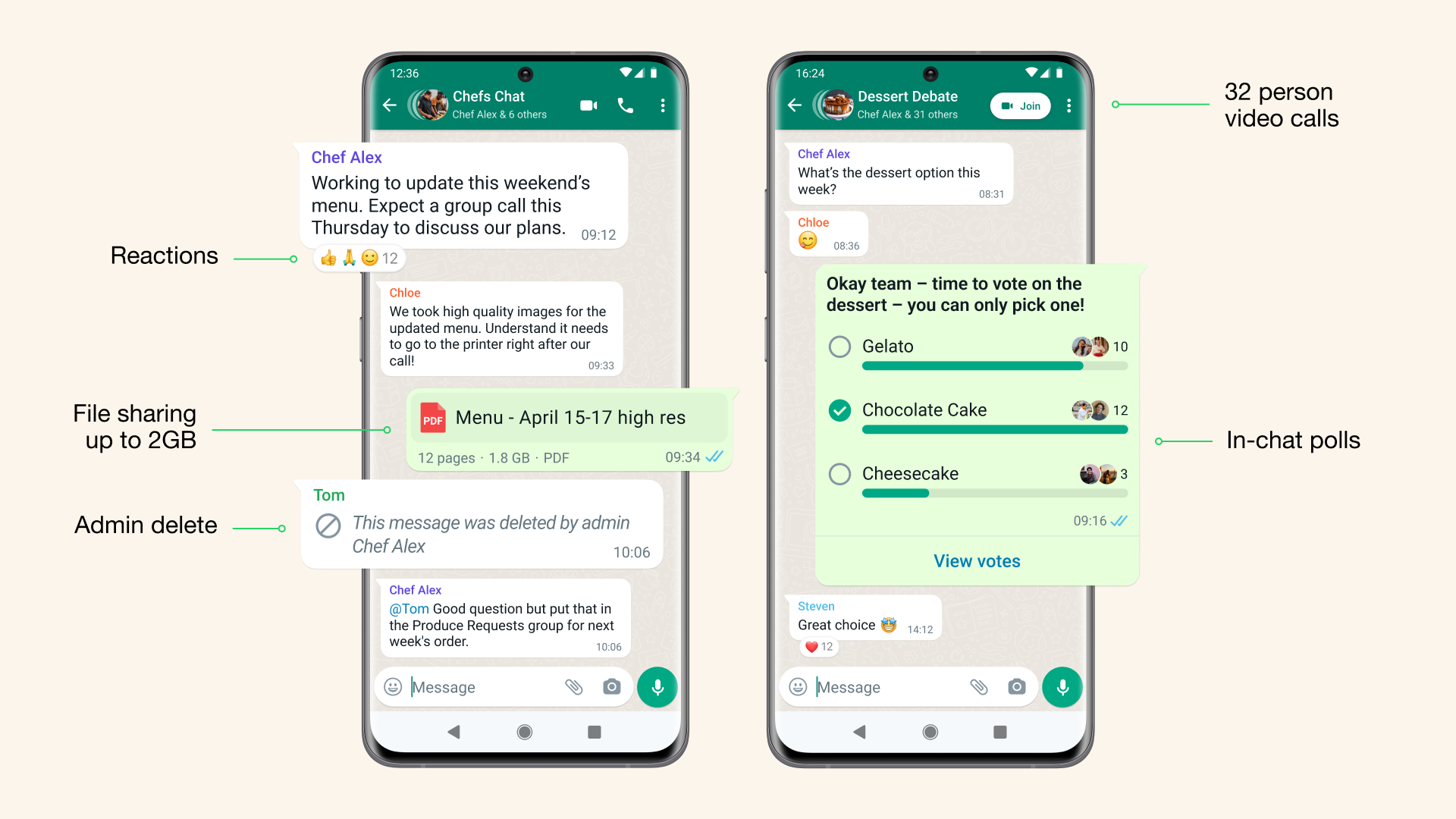Faux Pas In WhatsApp Conversations: A Comprehensive Guide To Avoiding Fake Discussions
WhatsApp has become one of the most popular communication platforms worldwide but faux discussions can ruin your experience. Imagine sending a heartfelt message only to realize later that it was all fake. It's like buying an expensive watch just to find out it's counterfeit. In this article we will dive deep into the world of "faux discussion WhatsApp" and help you navigate through the complexities of digital conversations.
Let's face it – we've all been there. You're scrolling through your WhatsApp chats when you stumble upon something that feels off. Maybe it's a suspicious link or an unusually formal tone from a friend. These faux discussions can not only waste your time but also jeopardize your privacy and trust. So, how do you spot them? And more importantly, how do you avoid falling into their traps?
This article is here to help you out. We'll break down everything you need to know about faux discussions on WhatsApp. From identifying fake messages to protecting yourself online, we've got you covered. So grab a cup of coffee, sit back, and let's dive into the world of digital communication!
Understanding Faux Discussions on WhatsApp
What Are Faux Discussions?
Faux discussions on WhatsApp refer to conversations or messages that appear genuine but are actually fake. These can come in various forms – phishing attempts, impersonation scams, or even automated bots trying to trick you. Think of it like a wolf in sheep's clothing. These discussions often aim to gather personal information, spread misinformation, or even install malicious software on your device.
For instance, you might receive a message from someone pretending to be a colleague asking for sensitive data. Or perhaps a group chat suddenly starts promoting suspicious links under the guise of "exclusive offers." These are all red flags that indicate a faux discussion. Recognizing these patterns early can save you a lot of trouble down the line.
Why Do Faux Discussions Exist?
The Motivation Behind Fake Conversations
There are several reasons why faux discussions exist on WhatsApp. One of the primary motivations is financial gain. Scammers often target unsuspecting users by tricking them into sharing bank details or credit card information. Another reason is data theft. By posing as a trusted contact, scammers can extract valuable personal information that could be used for identity theft or other malicious purposes.
Some faux discussions are purely for spreading misinformation. In today's digital age, fake news can spread like wildfire through messaging apps. Politically motivated groups or individuals may use WhatsApp to disseminate false narratives and influence public opinion. Understanding the motivations behind these discussions can help you stay vigilant and protect yourself from potential harm.
Common Types of Faux Discussions
- Phishing Scams: Messages designed to steal your personal information.
- Impersonation Attacks: Pretending to be someone you know to gain trust.
- Automated Spam: Bots sending out repetitive or irrelevant content.
- Malware Distribution: Links or files that install harmful software on your device.
Each of these types poses a unique threat to your online safety. Phishing scams, for example, often involve messages that appear to come from legitimate sources like banks or government agencies. They may ask you to click on a link or provide sensitive information, which can lead to significant financial losses. Impersonation attacks, on the other hand, rely on building trust by pretending to be someone familiar, making them particularly dangerous.
How to Spot Faux Discussions
Key Indicators of Fake Conversations
Identifying faux discussions requires a keen eye for detail. Here are some common indicators to watch out for:
- Unusual Language: If the message contains grammar mistakes or overly formal language, it could be a red flag.
- Unexpected Requests: Be cautious if someone suddenly asks for personal or financial information.
- Suspicious Links: Always verify links before clicking on them. Hover over the link to see where it leads.
- Uncharacteristic Behavior: If a contact's tone or behavior seems off, it might indicate impersonation.
For example, you might receive a message from a "friend" asking for money due to an emergency. While it's possible they're genuinely in trouble, it's always best to verify the request through a phone call or another communication channel. Similarly, if you receive a link claiming to offer a "limited-time discount," think twice before clicking on it.
Protecting Yourself from Faux Discussions
Best Practices for WhatsApp Safety
Now that you know what faux discussions look like, let's talk about how to protect yourself. Here are some practical tips to enhance your WhatsApp security:
- Enable Two-Factor Authentication: This adds an extra layer of security to your account.
- Be Cautious with Unknown Contacts: Avoid engaging with people you don't recognize.
- Update Your App Regularly: WhatsApp frequently releases updates to patch security vulnerabilities.
- Report Suspicious Activity: If you encounter a faux discussion, report it to WhatsApp immediately.
Two-factor authentication is particularly effective in preventing unauthorized access to your account. By requiring a verification code sent to your phone, it makes it much harder for scammers to impersonate you. Additionally, keeping your app updated ensures that you have the latest security features and bug fixes.
Real-Life Examples of Faux Discussions
Case Studies from Around the World
To better understand the impact of faux discussions, let's look at a few real-life examples:
Case 1: In 2021, a phishing scam targeted WhatsApp users by sending messages claiming they had won a prize. The message included a link to claim the reward, which actually led to a malicious website designed to steal personal information.
Case 2: A group of scammers used impersonation tactics to gain access to a company's internal WhatsApp group. By posing as senior executives, they convinced employees to transfer large sums of money to fake accounts.
These examples highlight the importance of staying vigilant and informed. While these incidents may seem rare, they can happen to anyone, anywhere. Being aware of the risks is the first step in protecting yourself.
The Psychology Behind Faux Discussions
Why Do People Fall for Scams?
Understanding the psychology behind faux discussions can help you recognize why people fall for scams. Scammers often exploit basic human instincts such as trust, fear, and urgency. For instance, a message claiming your account will be suspended unless you take immediate action plays on your fear of losing access to important services.
Similarly, urgency is a powerful motivator. Scammers may create a sense of urgency by offering limited-time deals or threatening consequences if you don't act quickly. This can cloud your judgment and make you more likely to fall for their tricks. By being aware of these psychological tactics, you can better resist their influence.
Legal Implications of Faux Discussions
What Happens to Scammers?
Faux discussions are not just unethical – they're also illegal in many jurisdictions. Scammers who engage in phishing, impersonation, or malware distribution can face severe legal consequences. Depending on the severity of the offense, penalties may include hefty fines, imprisonment, or both.
However, prosecuting scammers can be challenging due to the global nature of the internet. Many operate from countries with lax cybersecurity laws or use anonymous proxies to hide their identities. Despite these challenges, law enforcement agencies around the world are increasingly collaborating to combat cybercrime and protect users from faux discussions.
Tips for Educating Others About Faux Discussions
Spreading Awareness
One of the best ways to combat faux discussions is by educating others. Here are some tips for spreading awareness:
- Share Articles and Resources: Use this article and other reputable sources to inform your friends and family.
- Host Workshops: Organize sessions to teach people about online safety and faux discussions.
- Use Social Media: Post tips and warnings on platforms like Facebook, Twitter, and Instagram.
Education is key to preventing faux discussions from spreading. By sharing your knowledge with others, you can help create a safer digital environment for everyone. Remember, a well-informed community is a resilient community.
The Future of WhatsApp Security
What Lies Ahead?
As technology evolves, so do the methods used by scammers. WhatsApp is constantly working to improve its security features and combat faux discussions. Future updates may include advanced AI-driven tools to detect and block suspicious messages automatically. Additionally, end-to-end encryption will continue to play a crucial role in protecting user privacy.
However, no system is foolproof. It's up to each user to remain vigilant and take responsibility for their online safety. By staying informed and following best practices, you can minimize the risk of falling victim to faux discussions.
Conclusion
Faux discussions on WhatsApp are a growing concern, but with the right knowledge and tools, you can protect yourself and others. By recognizing the signs of fake conversations, implementing security measures, and spreading awareness, you can contribute to a safer digital community. So, the next time you receive a suspicious message, remember to pause, verify, and act responsibly.
We encourage you to share this article with your friends and family. Together, we can make the internet a safer place for everyone. And don't forget to leave a comment below with your thoughts or experiences related to faux discussions. Your input could help others stay safe online!
Table of Contents
- Understanding Faux Discussions on WhatsApp
- Why Do Faux Discussions Exist?
- Common Types of Faux Discussions
- How to Spot Faux Discussions
- Protecting Yourself from Faux Discussions
- Real-Life Examples of Faux Discussions
- The Psychology Behind Faux Discussions
- Legal Implications of Faux Discussions
- Tips for Educating Others About Faux Discussions
- The Future of WhatsApp Security

WhatsApp Doesn't Export Your Messages Every Night—But It Does Have

WhatsApp officially launches its new discussion group feature

WhatsApp officially launches its new discussion group feature